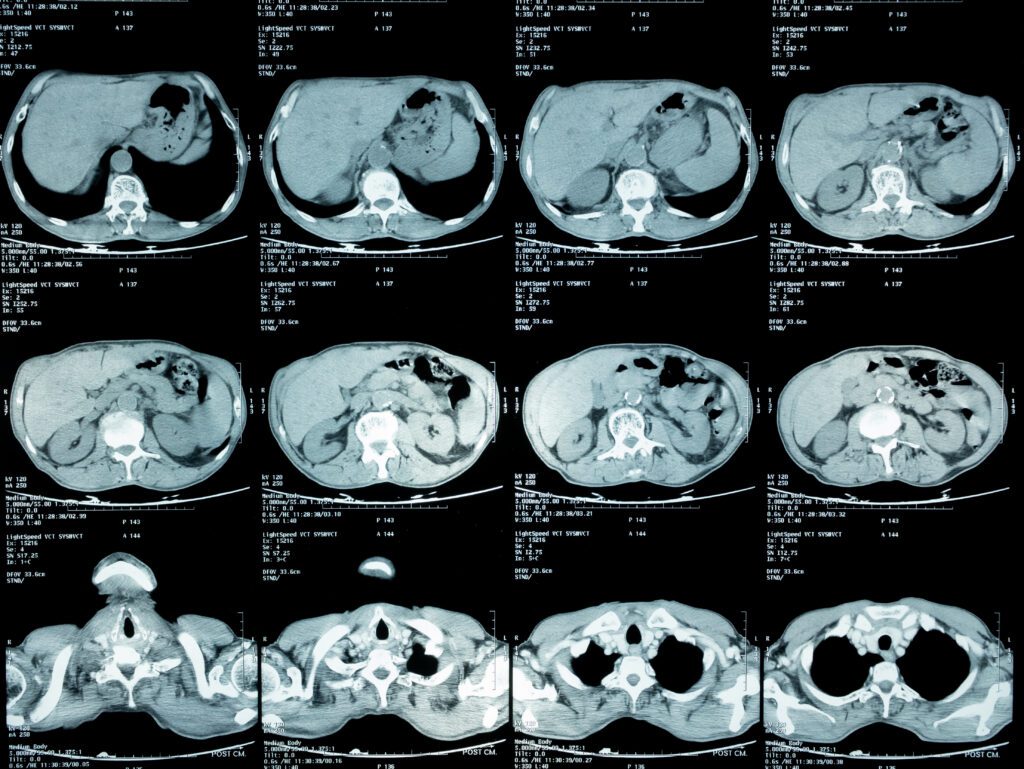When you’re experiencing pain or discomfort in your mid-section, your healthcare provider may recommend an MRI of your abdomen, to take a closer look. If you are experiencing an emergency, dial 9-1-1.
An abdominal MRI is a great choice because it will give your provider a highly detailed image of your abdomen area.
This guide will tell you everything you need to know before an abdominal MRI, including tips on how to prepare, and what you can expect during the scan.
Let’s take a closer look at what an abdominal MRI is, and why your provider recommends it, so you can be fully informed before your scan.
What is an abdominal MRI?
An abdominal MRI (Magnetic Resonance Imaging) is a non-invasive imaging technique that utilizes powerful magnets and radio waves to generate detailed images of the structures and organs within your abdomen. This procedure is distinct in that it doesn’t use radiation, which is a significant advantage for many patients.
During the scan, you’ll lie on a movable bed that slides into a large, cylindrical machine, the MRI scanner. Inside, the scanner creates a strong magnetic field around you, and radio waves are sent through your body. These waves are then captured by the scanner, which translates them into clear, cross-sectional images of your abdomen.
The resulting images are highly detailed, allowing healthcare professionals to observe even minor changes in your tissues and organs. This high level of detail makes MRI an invaluable tool in diagnosing and monitoring a variety of health concerns.
Why might my healthcare provider recommend an abdominal MRI?
There are several reasons why your healthcare provider might suggest an abdominal MRI. The primary purpose is to diagnose, monitor, or rule out various conditions that affect the abdominal organs, such as the liver, kidneys, pancreas, gallbladder, and spleen.
- Identifying abnormalities: If you’re experiencing unexplained pain, swelling, or other changes in your abdominal area, an MRI can help identify the underlying cause. It’s particularly effective in detecting tumors, cysts, and other growths.
- Monitoring chronic conditions: For those with known conditions, such as liver disease or kidney disorders, an MRI provides a detailed view of the affected organs. This is crucial for assessing the progression of the condition and the effectiveness of treatments.
- Post-treatment evaluation: After treatment for an abdominal condition, an MRI can evaluate the success of the intervention. It helps in detecting any remaining signs of the disease or in checking for recurrence.
- Guiding treatment plans: In some cases, the detailed images from an MRI can assist healthcare providers in planning surgeries or other treatments, ensuring precision and effectiveness.
An MRI is a powerful tool for your care, offering critical insights to your healthcare provider and aiding in the best possible decision-making for your health and well-being.

Preparing for your abdominal MRI scan
Getting ready for your abdominal MRI will be straightforward if you follow your provider’s instructions, which will help ensure your scan goes smoothly, and provide more accurate results.
Here’s what you need to know about getting ready for your MRI scan.
What should I do before the MRI scan?
Before your MRI, your healthcare provider will give you specific instructions based on your individual health needs. Generally, you’ll be asked to complete a screening form to ensure MRI safety. This form covers questions about any metal implants, pacemakers, or other devices in your body, as MRI uses strong magnetic fields.
It’s also important to inform your healthcare provider about any allergies or health conditions you have. If you experience anxiety or claustrophobia, let them know, as they may provide options to make you more comfortable during the scan.
Will I need to change my diet or medication?
In some cases, you may be asked to fast for a few hours before your MRI. This helps to reduce the risk of stomach discomfort during the scan and can improve image quality. However, this isn’t always necessary, so follow the specific instructions given to you.
Regarding medications, generally, you can continue taking your prescribed medications unless instructed otherwise. If you’re unsure, it’s always a good idea to check with your healthcare provider. They will tell you if any of your medications need to be adjusted or temporarily stopped before the scan.
How should I prepare on the day of the MRI?
On the day of your MRI, dress comfortably in clothing without metal zippers, buttons, or snaps, as metal can interfere with the magnetic field and imaging. You’ll likely be asked to change into a gown provided for the scan.
Leave jewelry and other metal accessories at home to avoid delays. You’ll also be asked to remove hearing aids, dentures, and eyeglasses before the scan. If you have concerns about lying still for an extended period, discuss this with the MRI staff as they can provide pillows or blankets for comfort.
Remember to arrive a bit earlier than your scheduled appointment to complete any necessary paperwork and relax before the procedure. This is also a good time to ask any last-minute questions you might have about the scan.
During the abdominal MRI scan
An MRI is a very common scan that many people experience each day, and your imaging center is staffed with experienced and trained healthcare professionals, who will take great care of you.
Let’s focus on what you can expect during an abdominal MRI scan.
What will happen when I arrive at the imaging center for my MRI?
When you arrive for your MRI, you’ll be greeted by the center’s staff who will guide you through the process. Initially, you’ll be asked to confirm your identity and the details of your appointment. This is also a great time to ask any last-minute questions or express any concerns you might have.
You’ll then be shown to a changing area where you’ll be asked to change into a gown, ensuring that there are no metal parts on your clothing that could interfere with the scan. Secure lockers are usually provided to store your personal belongings, including any metal objects, during the scan.
What can I expect during my MRI scan?
During the MRI scan, you’ll be asked to lie down on a motorized table that slides into the MRI machine. The technologist will make sure you’re comfortable. Communication is key; you’ll be able to talk to the MRI staff through a microphone in the scanner, and they’ll hear you at all times.
Once the scan starts, it’s important to stay as still as possible to ensure clear images are captured. The MRI machine makes a series of loud thumping and buzzing noises, which is completely normal. Some centers provide headphones or earplugs to help reduce the noise.
Throughout the scan, the technologist monitors you from another room but can communicate with you at any point. It’s a good idea to practice some deep, relaxing breaths to help you stay calm and still.
How long does an abdominal MRI typically take?
Typically, the scan takes about 30 to 60 minutes, depending on what exactly your provider wants to see and whether your provider has requested contrast or not. During this time, several sets of images are taken, which requires the machine to be stopped and started a few times.
It’s worth noting that some scans might be shorter or longer, so it’s a good idea to plan for a little flexibility in your schedule. After the scan, you can usually resume your normal activities immediately, unless you’ve been given specific post-scan instructions.
After your abdominal MRI
Your MRI results are very important to your healthcare provider and to your care plan. Remember, your results are the entire reason why your provider recommended an abdominal MRI.
Let’s find out how you can get your MRI results, what to expect after your scan, and what happens if your provider has a concern about your health.
When and how will I receive my MRI results?
After your abdominal MRI scan, the radiologist, a doctor specialized in reading and interpreting MRI images, will analyze the results.
Once the radiologist has completed their analysis, the results will be sent to your healthcare provider, who will then discuss them with you at your follow up appointment. In addition, you will receive a text message from Touchstone with a link to view your patient friendly report with easy to understand explanations and diagrams for medical terminology to better prepare you for you appointment with your provider.
The timeframe for receiving your results can vary, so it’s a good idea to ask your provider when you can expect to hear back. Typically, you’ll have a follow-up appointment or a phone call to go over the findings and discuss any next steps.
Are there any follow-up steps after the scan?
Generally, there are no specific follow-up steps required immediately after an MRI scan. You can resume your normal activities right away.
However, if you were given a contrast dye during the scan, it’s a good idea to drink plenty of water to help flush it out of your system.
If any concerns were noted during the scan, your healthcare provider might recommend additional tests or procedures for further evaluation. This is a normal part of the diagnostic process, and helps ensure that you receive the most accurate and effective care.
After my MRI, what are the next steps in my medical care?
The next steps in your medical care will depend on the results of your MRI scan. On the one hand, if the scan shows that everything is normal, your provider may simply continue with your current care plan.
On the other hand, if the scan reveals something that requires further investigation or treatment, your provider will discuss the options with you. This could include further diagnostic tests, a referral to a specialist, or starting a new treatment plan.
How to schedule your MRI appointment with us
Touchstone Medical Imaging offers MRI scans in Arkansas, Colorado, Florida, Montana, Oklahoma, and Texas.
Reach out to us at Touchstone, and we’ll help you schedule a mammogram appointment at an imaging center near you, today.
We’re here to help you get the answers you need.


Frequently Asked Questions About Abdominal MRIs
An abdominal MRI is a non-invasive imaging test that uses magnetic fields and radio waves to create detailed images of organs and structures inside your abdomen.
Your healthcare provider may recommend an abdominal MRI to diagnose or monitor a range of conditions affecting your abdominal organs, such as liver disease, kidney issues, or intestinal problems.
Before an MRI scan, follow your doctor’s instructions, which may include fasting for a few hours or avoiding certain medications.
You may need to adjust your diet or medication before the scan, depending on your specific health condition and the area being examined.
On the day of the MRI, wear comfortable, metal-free clothing and arrive at the imaging center with any necessary documentation.
Upon arrival at the imaging center, you’ll check in, complete any needed paperwork, and receive instructions on how to prepare for the scan.
During the MRI scan, you will lie still on a table that slides into the MRI machine, and you may hear loud noises as the machine takes images.
An abdominal MRI usually takes between 30 to 60 minutes, depending on your individual situation.

